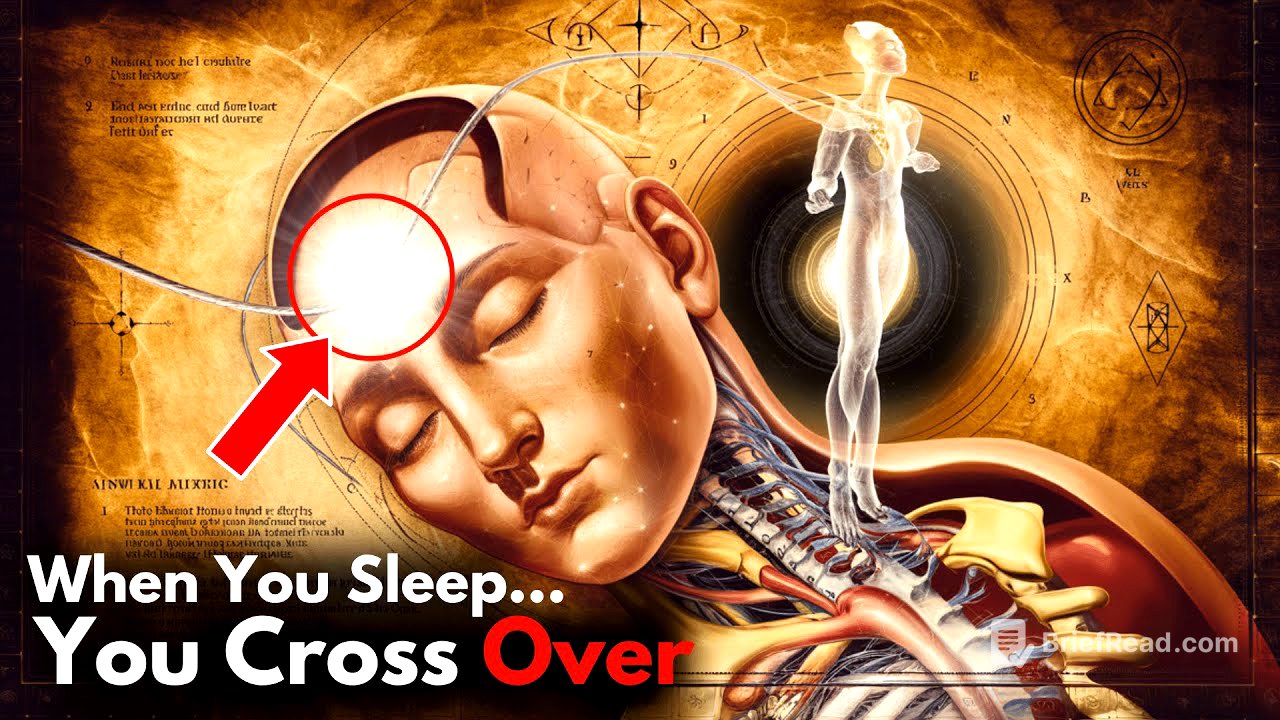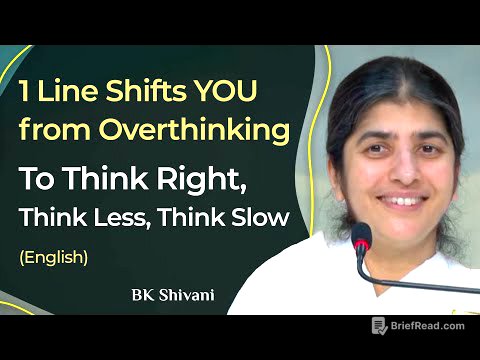TLDR;
This video explores what happens to your consciousness when you sleep, drawing from spiritual traditions and scientific research. It discusses how your mind remains active, potentially traveling to other realms or dimensions. The video also covers techniques to influence your dreams, interpret their meanings, and navigate the challenges of the dream world.
- Consciousness may detach from the body during sleep, accessing other dimensions.
- Emotional and mental states before sleep influence dream experiences.
- Dreams can be messages from the unconscious, glimpses of the future, or spiritual encounters.
- Techniques like dream journaling, lucid dreaming, and energy cleansing can enhance sleep experiences.
The Mystery of Sleep and Consciousness [0:04]
The video starts by posing the question of where our consciousness goes when we sleep, highlighting that while the body rests, the mind remains active. Ancient cultures believed the soul detaches and travels to other realms during sleep, with dreams seen as messages from the gods. Even today, sleep is essential for brain function, and during certain stages, brain activity resembles deep meditation or near-death experiences. The question arises whether these experiences are mere illusions or if something real is happening when people report lucid dreams and spiritual encounters.
The Journey of Consciousness [1:47]
When you sleep, your body goes into a deep state, and your brain frequency slows down, dissolving your perception of the physical world. However, your consciousness doesn't shut off; it remains active. During the REM stage, vivid dreams and intriguing experiences occur. Research suggests that consciousness can detach from the physical body and access other dimensions, a phenomenon known as astral projection or out-of-body experience (OBE). Many people don't notice this because they've been conditioned to view reality based on what can be measured. Those who've had OBEs report freedom, expanded perception, and the ability to visit new places. Your emotional and mental state before sleep can influence where your consciousness goes.
Programming Your Subconscious Mind [4:25]
The moments before sleep are a powerful opportunity to program the subconscious mind and direct your consciousness. In the hypnogogic phase, the threshold between wakefulness and dreams, your mind is receptive to suggestions. Before sleeping, tell your brain what you want, such as waking up refreshed, finding new ideas, or solving problems. This works directly on the subconscious, which then works to find answers. This technique can be combined with the intention of having spiritual experiences, like repeating phrases about being conscious in the astral world.
Where Does Your Consciousness Go? [6:30]
Where your consciousness goes during sleep depends on your perception, emotional state, and intentions. Some people have vivid dreams, others lucid dreams, and some experience floating outside their bodies. Similar experiences are described by mystics, monks, and those who've had near-death experiences. Many claim to access places that defy three-dimensional logic, like cities of light or dimensions with different time-space rules. Accounts of people accurately describing details of places they've never been physically suggest that something real is happening. Quantum physics suggests consciousness isn't restricted to the brain.
Dreams as Messages from the Unconscious [8:54]
Dreams have always been a mystery, studied by different cultures. Freud saw dreams as expressions of the unconscious, while Carl Jung saw them as a portal to the collective unconscious. Lucid dreams feel like out-of-body experiences, encounters with spiritual entities, or glimpses of the future. Spiritual traditions suggest consciousness travels through different planes of existence during sleep. Some people report having the same dream as others, suggesting our consciousness can interact while we sleep, connecting to a larger field of information.
Shared Dreamscapes and Premonitions [11:29]
Not all dreams are random; some carry important messages, signs, or premonitions. In the sleep state, our minds aren't restricted by physical reality. Physicist John Wheeler proposed that the past can be influenced by the future. Some scientists have investigated precognitive dreams, like Abraham Lincoln's dream of his death or people dreaming of disasters before they happened. Carl Jung called this synchronicity. Precognitive dreams tend to be vivid with specific details and a strong sense of reality.
Types of Dreams and Interpretation [13:39]
There are different types of dreams, each with a specific meaning: symbolic dreams, precognitive dreams, lucid dreams, and spiritual dreams. To interpret dreams, pay attention and set intentions. Practice dream journaling to write down everything you remember upon waking. Patterns and messages will emerge over time.
The Astral Plane and Its Dimensions [14:43]
The astral plane is an intermediate level of existence where thoughts and emotions take form. It's a malleable dimension where reality shifts according to the vibration and intention of consciousness. People who've had out-of-body experiences describe different layers of this plane, some bright and peaceful, others chaotic and dense. These dimensions are classified into lower, middle, and higher astral planes. Some people access these planes spontaneously, while others train to access them through lucid dreaming or mindfulness.
Spiritual Encounters During Sleep [16:34]
Spiritual encounters during sleep involve meeting light beings, spiritual mentors, deceased loved ones, or even living people. This may be due to the malleable nature of the astral plane, which responds to intentions and frequencies. If consciousness frees itself from physical limitations, real spiritual encounters can happen. People who've lost loved ones often dream of them vividly, receiving messages. Some esoteric traditions claim we can be taken to spiritual schools during sleep, receiving teachings. To have more control, set clear intentions before sleep, like meeting your spiritual guide.
Understanding and Controlling Nightmares [18:33]
Nightmares serve as symbolic messages from the unconscious, emotional alerts, or experiences in denser dimensions of astral reality. Neuroscience shows the brain processes emotions during sleep. The threat simulation theory suggests nightmares prepare us for real-life challenges. Nightmares occur during the REM phase. People who undergo traumatic events tend to have more nightmares. To avoid negative experiences, practice energy cleansing, mental reprogramming, and avoid heavy foods at night. Develop awareness in dreams through lucid dreaming.
Transforming Nightmares and Remembering Dreams [21:13]
Some spiritual traditions teach that nightmares can be opportunities for learning. Practitioners train to stay calm within a nightmare and face it consciously. Understanding and reinterpreting nightmares can transform fear into self-knowledge. Most people forget dreams because the brain shifts focus to physical reality upon waking. Dream memory can be developed with practice by keeping a notebook and writing down everything you remember.
Dangers and Challenges of the Dream World [22:59]
There are obstacles when exploring consciousness during sleep, from nightmares to encounters with unknown entities. Sleep paralysis occurs when a person partially wakes up but can't move. Spiritually, this can occur when consciousness returns from an astral experience. Stay calm, focus on breathing, and remember it's temporary. Encounters with unknown entities can be symbolic manifestations of the mind or interactions with consciousnesses in subtle dimensions. Don't give in to fear.
Navigating the Dream Universe Safely [25:17]
Excessive activity in dreams can lead to mental exhaustion. Develop techniques for grounding energy upon waking, like drinking water or walking barefoot. Create a ritual before sleep with meditation, prayer, or visualizing light. Avoid negative content before sleep. Sleep is a gateway to hidden dimensions, a laboratory of the unconscious, and a tool for spiritual evolution. Your emotional state influences nightly experiences, and you can program your mind to receive answers.









